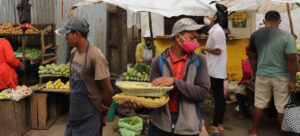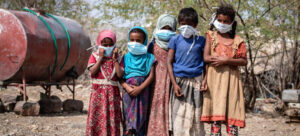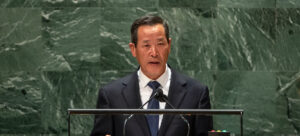Speaking at the event, the Executive Secretary of the Comprehensive Nuclear-Test-Ban Treaty Organization (CTBTO) pointed to its “near universal adherence”, with 185 signatures and 170 ratifications.
He said that the Treaty “has created and sustained a norm against nuclear testing so powerful, that less than one dozen tests have been conducted since adoption, and only one country has violated it this millennium.”
A proven record
Before the adoption of the treaty in 1996, the average explosive yield of nuclear tests each year was equivalent to nearly 1,000 Hiroshima-sized bombs.
“Nuclear testing not only created geopolitical instability and supported the development of more powerful and deadly nuclear weapons, it also caused untold human suffering and environmental damage. Because of the CTBT, we have left this world far behind,” Mr. Floyd said.
In addition to its core mission, the Treaty includes a verification regime in the form of a global network, that provides useful data for civil and scientific purposes, including tsunami warning and climate change studies.
Established under the treaty, the International Monitoring System (IMS), provides round-the-clock, real-time monitoring of any explosive nuclear activities on Earth, and is now more than 90% complete, with over 300 stations certified.
A renewed push
Despite its 185 signatures, the Treaty is yet to enter into force, which would require ratification by eight countries (the US, China, Iran, Israel, Egypt, India, Pakistan and North Korea).
For Mr. Floyd, “anniversaries are a time for renewal of commitments.”
He cited a “real appetite for civil society and youth engagement” on the issue, and declared that the ultimate objective is clear: the total elimination of nuclear weapons.
“But we cannot hope to achieve a nuclear weapons-free world without a universally applied, non-discriminatory, and verifiable prohibition on nuclear testing,” he argued.
A continuous threat
Still to this day, there are still 13,400 nuclear weapons around the globe. Some countries continue to seek nuclear capabilities, and others are working to expand their nuclear arsenals.
Addressing Council Members, the UN Under-Secretary-General of Disarmament Affairs, Izumi Nakamitsu, pointed to a “worrisome trend towards the modernization and expansion of nuclear arsenals.”
“As the global arms control regime has crumbled, multilateral nuclear disarmament diplomacy has atrophied. As relations continue to decline amongst States that possess nuclear weapons, we cannot take for granted that the norm against nuclear testing will hold,” she said.
‘Lasting damage’
For Ms. Nakamitsu, nuclear testing “has done lasting damage to pristine environments, human health and some of the most vulnerable communities”, from the deserts of Nevada, to the steppes of Semipalatinsk; from the outback of Australia to the atolls of the South Pacific.
Besides those impacts, she argued that the tests have also “enabled the quantitative and qualitative improvements of nuclear weapons, announcing the arrival of new nuclear-armed States and facilitating dangerous growth in the arsenals of their predecessors.”
Overcoming challenges
For the Under-Secretary General, the 25th anniversary of the treaty is a reason to celebrate, but also to rethink what can be done to overcome the challenges that still lie ahead.
She argued that this can be done on several fronts.
First, further empowerment of young people. Second, it has to be understood that the CTBT does not operate in a vacuum, and that it works in tandem with other processes. Third, and finally, the international community must continue to strengthen the CTBTO’s technical capabilities.
Magdalene Wanyaga, a Kenyan member of the CTBTO Youth Group, also participated in the meeting, sharing her views on how civil society and youth can creatively contribute to this mission.
High-level conference
Last week, the high-level Conference on Facilitating the Entry into Force of the CTBT, included global calls for it to become binding and fulfil its potential to end all nuclear explosions.
Ministers and senior officials from more than 60 countries participated, joining UN Secretary-General, António Guterres, and UN General Assembly President, Abdulla Shahid.
At the event, Mr. Guterres urged eight key countries which have not yet signed or ratified the Treaty, to do so without delay.
“Given its necessity and readiness, it is both disappointing and frustrating that the Treaty has not yet entered into force. We all know the reason for this – the eight remaining Annex II States whose ratifications are required for the Treaty’s entry-into-force”, he said.
Find out more about the Treaty
- TREATY TEXT
- STATUS OF SIGNATURE AND RATIFICATION
- HISTORY: SUMMARY
- HISTORY: 1945-1993
- 1945-54: Early efforts to restrain nuclear testing
- 1955-62: From peace movement to missile crisis
- 1963-77: Limits on nuclear testing
- 1977-94: Renewed test-ban commitments
- 1993-1996: TREATY NEGOTIATIONS
- 1993-95: Prelude and formal negotiations
- 1994-96: Debating the basic issues
- 1994-96: Creating the organization
- 1994-96: Entry into force formula
- 1994-96: Monitoring and inspection
- 1996: CTBT: A long-sought success
- Further reading
- DEVELOPMENTS AFTER 1996
- 1996-97: Creating a CTBTO Preparatory Commission
- 1998: Emerging nuclear armed states
- 1999-2002: The United States and the CTBT
- 1999-2004: CTBT’s expanding role
- 2005-07: Continued challenges for nuclear arms control
- Interview: Jaap Ramaker, chairman of the CTBT negotiations in 1996
- 2009 DPRK Announced Nuclear Test
- 2013 DPRK Announced Nuclear Test
- 2016 DPRK Announced Nuclear Test
- 2016 Sept DPRK Announced Nuclear Test
- 2017 Sept DPRK
- ARTICLE XIV CONFERENCES
- 2021
- 2019
- 2017
- 2015
- 2013
- 2011
- 2009
- 2007
- 2005
- 2003
- CTBT MINISTERIAL MEETINGS
- 2018
- 2016
- 2016: CTBT20 Ministerial Meeting
- 2014
- 2012
- 2010
- 2008
- 2006
- 2004
- 2002
- INTERNATIONAL DAY AGAINST NUCLEAR TESTS
- LEGAL RESOURCES
- COUNTRY PROFILES








